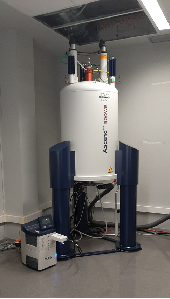Equipment of the Month: 500 MHZ SPECTROMETER

The General Research Services, SGIker, have incorporated a new 500 MHZ spectrometer for experiments in solid to its scientific-technological infrastructure in the Nuclear Magnetic Resonance Unit (NMR) of Gipuzkoa.
The new instruments have been financed from the General State Budget and have been requested through a special action of the Department of Education, Vice-Ministry of Universities and Research of the Basque Government.
The spectrometer is configured for NMR studies and experiments on all types of solid and semi-solid materials: porous materials, ceramics, zeolites, nano-particles, polymers, functionalized membranes, gels, resins, and biological material. These characteristics allow the versatility required to meet the needs raised by research groups.
The new equipment is used to analyze organic and inorganic complexes. In pharmaceuticals it is applied in the study of polymorphs and, in archeology and the environment, in the investigation of bones, wood, cellulose and soil. Likewise, it is used to investigate samples of microcoporous and mesoporous solids (zeolites, aluminosilicates, phosphates). It is also applied in materials such as minerals, glasses, ceramics, semiconductors, metals and alloys.
The 500 MHz spectrometer, acquired at NMR in Gipuzkoa, is characterized by having a wide-mouth 11.7 Tesla superconducting magnet, a homogeneity and Lock channel system, and a 3-channel radiofrequency console for transmission-reception. It incorporates two probes, a triple PH MASDVT500W2 BL3.2 H/X/Y and another double CP-MAS of 4mm, 1H/X(15N-31P) of variable temperature. It incorporates an interchangeable insert X/Y 13C/15N or 27Al/29Si or 13C/29Si or 31P/27Al or 31P/13C. It is made up of two units, the first rotates the samples and the second serves to control the temperature.
Nuclear Magnetic Resonance of solids is a non-destructive technique and one of the most powerful to carry out qualitative and quantitative analysis of solid materials due to the wide variety of information it offers. There are only a dozen institutions in Spain that have this technique and the SGIker of the UPV/EHU are one of the few research support organizations with more than one active team.
For more information:
- Dr. Inaki Santos
- joseignacio.santosg@ehu.eus
- Joxe Mari Korta Center, Gipuzkoa Campus UPV/EHU Tolosa Avenue 72 20018 Donostia

